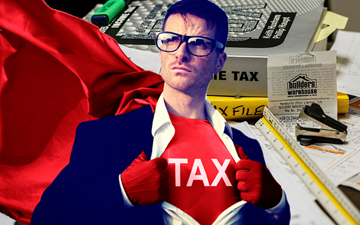Canadian tax professionals: A Canadian tax lawyer's guide

Canadian tax lawyer and accountant David J Rotfleisch breaks down the classifications and the kind of work done by Canadian tax professionals
 |
Both a tax accountant and tax lawyer, David J Rotfleisch, CPA, CA, JD, is the founding tax lawyer of Rotfleisch & Samulovitch P.C., a Toronto-based boutique tax law firm. He appears regularly in print, radio and TV. |
Introduction: Tax Professional Categories
Finding the appropriate Canadian tax professional to provide tax help in different scenarios can be difficult and confusing because there are different types of tax professionals and different types of tax problems require different tax expertise. There is also overlap between the work carried out by some types of tax professionals as well as unique services provided by different tax professionals.
The basic categories of tax professionals are:
- Canadian tax chartered professional accountants (CPAs)
- Canadian tax lawyers
- Canadian tax-preparation accountants
- tax-preparation services
In addition, many regular accountants have different levels of tax expertise, most notably when it comes to tax return preparation.
Types of Canadian Tax Professionals
Canadian Tax Lawyers and Full-Time Tax CPAs
Both Canadian tax lawyers and tax CPAs generally practise full-time in the income tax field and there is some overlap in their education and in the tax services they provide. They both studied income tax in a detailed way. They will both typically have taken the In-Depth Tax Program from Chartered Professional Accountants Canada (CPA Canada) or its precursor, the In-Depth Tax Course formerly offered by the Canadian Institute of Chartered Accountants (CICA).
Some Canadian tax lawyers have a further recognition from the Law Society of Ontario which confers the designation of Certified Specialist in Taxation on Ontario tax lawyers who meet the LSO's criteria for tax expertise.
Both Canadian tax lawyers and Canadian tax CPAs will typically carry out tax planning by providing detailed tax planning memoranda. When it comes to the implementation of the tax planning advice, the tax lawyer will set up the corporations and draft the agreements, while the accountants will prepare the necessary tax election forms and any related tax returns.
If there is a CRA challenge to the tax plan, or an income tax audit or a challenge to any tax plan that has been implemented, the tax lawyer is usually better able to draft a notice of objection and make legal submissions, and the tax CPA is better able to deal with CRA challenges to the numbers. On a more complex file, typically the tax lawyer and either a tax CPA or a regular accountant will both be involved.
If the notice of objection is unsuccessful, the next step is an appeal to the Tax Court of Canada and this has to be carried out by a tax lawyer. Again, an accountant will often be involved and may sometimes be a witness.
Non-tax CPAs
Most CPAs who are not tax specialists have studied income tax, have tax knowledge and routinely prepare personal, corporate and trust tax returns. The typical accounting engagement involves preparing financial statements and related corporate and personal tax returns. CPAs will also prepare individual tax returns for clients.
When it comes to challenging a CRA tax assessment, or representing a taxpayer in a tax audit, some CPAs have the knowledge and ability and routinely do this. Others rarely get involved with tax disputes and lack the ability to effectively provide this tax service.
Tax-preparation services
There are many individuals and firms that provide tax-preparation services. Some tax preparers operate on a franchise model and others provide individual tax-preparation services. The level of training and expertise varies greatly. Many of them are able to handle routine personal tax returns but some lack the tax expertise to prepare tax returns with any complications such as offshore assets. Historically, some small tax-preparation firms have involved their clients in tax fraud by claiming fraudulent expenses or deductions. If a non-CPA tax preparer tells a taxpayer that they can receive a refund on their taxes, where they have historically never received one, this is a red flag that should warn taxpayers to seek a second opinion.
Tax and Bookkeeping services
The background and training, and therefore the expertise, of bookkeepers is varied. Some bookkeepers will offer tax return preparation services. Some bookkeeping firms will prepare the books of the business, then send the results to a CPA firm for tax strategy, compliance and sign-off. [The workflow is often reversed by CPA firms that send the bookkeeping work to bookkeeping and/or tax preparation firms.] If you are considering using a bookkeeper to prepare your tax returns make sure you investigate their background and level of expertise.
Q&A: The Right Tax Profeessional for the Job
What tax professional should one hire for tax planning?
Tax planning, both simple tax planning and complex tax reorganizations, can be carried out by both Canadian tax lawyers and Canadian tax CPAs. Whichever tax professional one retains will provide a detailed tax memorandum setting out the facts of their client's tax situation in detail, tax planning objectives, and outlining the steps that need to be carried out to accomplish one's tax planning goals.
The implementation of the tax plan, whether drafted by a Canadian tax lawyer or a Canadian tax CPA, should only be carried out by a Canadian tax lawyer. The preparation of the related tax election forms and tax returns should only be done by a Canadian CPA.
What Canadian tax professional should one hire for a Canadian tax audit?
The nature of a Canadian tax audit dictates if one needs a Canadian tax lawyer, a Canadian tax CPA, or both. For example, a simple denial of expenses by the Canada Revenue Agency will typically require the submission of appropriate documentation. This should be handled by a Canadian tax CPA. On the other hand, a more complex tax audit that requires legal submissions, such as the denial of a principal residence exemption, will require technical legal analysis and submissions and should be carried out by a Canadian tax lawyer. Where there is a combination of legal issues and accounting issues, both a Canadian tax lawyer and a Canadian tax CPA should be involved.
What Canadian tax expertise is required for a net worth tax audit or net worth tax assessment?
A CRA net worth audit or assessment is an indirect tax audit verification method used by a CRA tax auditor who accuses a taxpayer of having insufficient books and records. The tax auditor will compare the increase in total net worth from the beginning of the net worth tax audit period to the end of the audit period and see if reported income supports the increase in net worth. The net worth analysis is supported by detailed schedules prepared by the CRA tax auditor and those tax schedules have to be analysed in detail since they often contain mistakes.
A Canadian tax lawyer or a Canadian tax CPA with specific expertise in net worth analysis is required to analyze the work done by the CRA tax auditor and to make detailed submissions about the appropriateness of the net worth audit methodology. Before hiring any Canadian tax specialist to assist with a net worth audit, a Canadian taxpayer needs to confirm the amount of experience that the tax specialist has had with challenging net worth assessments for other taxpayers.
What Canadian tax professional should one retain to challenge a CRA tax assessment?
To challenge a CRA tax assessment you have to file a notice of objection within 90 days of the date of assessment. If the issue is, for example, a simple denial of expenses because proper documentation was not submitted, then a Canadian tax CPA should be hired to submit the notice of assessment. However, if the tax problem is more complex, then a Canadian tax lawyer should be retained to set out the legal arguments in detail. If the tax issue is a blend of legal points and accounting issues, then both a Canadian tax lawyer and a Canadian tax CPA should be involved.
What Canadian tax professional should one retain to go to the Tax Court of Canada?
Only Canadian tax lawyers are trained to go to Tax Court on behalf of a taxpayer. Furthermore, a corporate taxpayer has to be represented by a Canadian tax lawyer in Tax Court. A Canadian tax CPA may be required as an expert witness in the trial.
What Canadian tax professional should one retain if charged with tax evasion or tax fraud?
If a Canadian is charged with tax evasion or tax fraud and convicted, they face at a minimum a monetary penalty left to 200 per cent of the tax abated and potential jail time. Only a Canadian tax lawyer can defend an individual against tax charges.
What Canadian tax professional should you retain to prepare your tax returns?
Depending on the complexity of one's tax return, a Canadian CPA or a tax-preparation service should be hired to prepare and submit your Canadian tax return.
What Canadian tax professional should one retain to submit a voluntary disclosure?
The Voluntary Disclosure Program, also called tax amnesty or VDP, is a CRA program that allows Canadian taxpayers to voluntarily admit to accidental or deliberate errors in their tax returns or failure to file tax returns or T11 35 offshore asset declarations. These are technical legal submissions that may end up in Federal Court if the voluntary disclosure is rejected at first instance and which may result in tax prosecution.
The voluntary disclosure submission should only be prepared by experienced Canadian tax lawyers even though some CPAs will say they have the expertise to make these submissions. The tax returns that are required as part of the voluntary disclosure submission package should only be prepared by Canadian CPAs. Some Canadian tax lawyers have accountants on staff to prepare those tax returns. Generally speaking, Canadian tax lawyers, unless they are also themselves CPAs (I am both a tax lawyer and CPA), lack the expertise to properly prepare tax returns and generally do not have professional liability insurance with respect to tax return preparation.
Can the CRA seize books and records from your Canadian tax professional?
The files of a Canadian tax lawyer are privileged and confidential and cannot be accessed by CRA or any other governmental authority. Files of an accountant, including a tax CPA, can be seized by way of search warrant. If one's tax situation requires solicitor-client privilege, then the Canadian tax lawyer can retain an accountant on your behalf and extend the privilege to the files of the accountant.
David J Rotfleisch, CPA, CA, JD, is the founding tax lawyer of Rotfleisch & Samulovitch P.C., a Toronto-based boutique tax law firm. He appears regularly in print, radio and TV. With over 30 years of experience as both a lawyer and chartered professional accountant, he has helped start-up businesses, resident and non-resident business owners and corporations with their tax planning, with will and estate planning, voluntary disclosures and tax dispute resolution including tax litigation in Tax Court and the Federal Court. Visit www.Taxpage.com and email David at david@taxpage.com.





(0) Comments